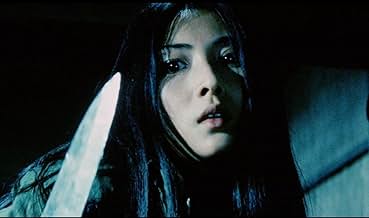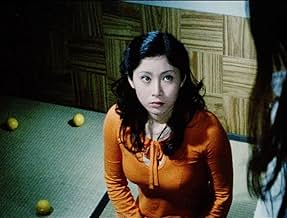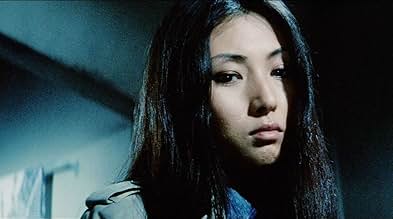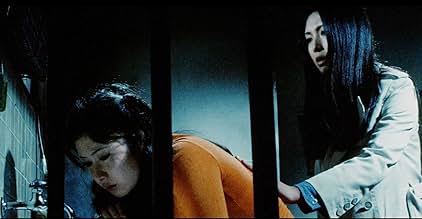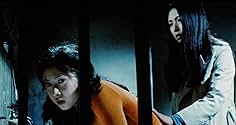NOTE IMDb
7,0/10
2,3 k
MA NOTE
Ajouter une intrigue dans votre langueMatsu is sheltered by an incestuous prostitute on her run from the police, her ex-prison mate and a cop whose arm she hacked off.Matsu is sheltered by an incestuous prostitute on her run from the police, her ex-prison mate and a cop whose arm she hacked off.Matsu is sheltered by an incestuous prostitute on her run from the police, her ex-prison mate and a cop whose arm she hacked off.
- Réalisation
- Scénario
- Casting principal
Avis à la une
This is Shunya Ito's final entry in the FEMALE CONVICT SCORPION series, starring the great Meiko Kaji. The series, based on a Japanese manga, follows the exploits of a woman unjustly imprisoned, brutalized by guards and fellow inmates, who defends herself with such aplomb, she becomes a jail-house legend. The other convicts nickname her Sasori, which means Scorpion. Over the course of two films, she escapes to wreak vengeance against the man who got her busted, is sent back for his murder, and escapes again; the second film ends with Sasori on the loose.
This, the third film, focuses on Sasori's life as a fugitive outside the walls. In an eye-opening first scene, Sasori evades detectives on a subway train; she comes out of it handcuffed to one of the detectives' arms, but not the rest of him. She flees to a slum which consists of a red-light district run by a forced-prostitution ring and a residential area made up of a mud street and shacks, where she is put up for the night and befriended by a lonely prostitute named Yuki. We soon discover that Yuki gives of herself on a nightly basis to her brain-damaged brother, who she keeps locked in a closet. Sasori tries to lead a normal life, taking a job as a seamstress and renting her own apartment, but she and Yuki soon meet again and are both embroiled in a plot that involves the Cruella De Ville-from-hell madam who runs the prostitution ring and the detective from the subway (Mikio Narita, a regular in Kinji Fukasaku films), who by God wants his arm back.
What follows is an atmospheric noir/horror yarn--it takes elements from both and uses them well--that applies Ito's flair for the visual to a mood that is different from the first two SCORPION films, yet bears the same unmistakable signature. A scene involving lit matches falling into a sewer tunnel is especially beautiful. Ito's use of sound, like when Sasori is incessantly scraping the handcuffs with the arm against a tombstone in an attempt to free herself, is as effective here as ever. He also employs silence more than usual, as if by virtue of a newly honed minimalism. This goes along with the relatively subdued tone of the first section of the film, which allows space to explore Sasori's and others' characters. Things pick up by the end, though it's all handled with a dreamier rhythm than the previous films. This is an asset. Each of the three films has its own style, I realize now, and seeing this one made me go back and watch the first, appreciating it more than before.
Meiko Kaji gives her usual amazing performance as Sasori, emoting silently, standing or moving or pouncing or maiming with a grace that switches seamlessly between human and animal. The pathos present in all three films is largely due to the human side of this grace, which never inhibits the films' darker aspects. Reportedly, Kaji, who did one more SCORPION film after this one, had as much to do with developing the character for film as Ito, not only in her performances, but off-camera as well. This film is a worthy swan song for the collaboration. Very Japanese, very seventies, very much something else entirely.
This, the third film, focuses on Sasori's life as a fugitive outside the walls. In an eye-opening first scene, Sasori evades detectives on a subway train; she comes out of it handcuffed to one of the detectives' arms, but not the rest of him. She flees to a slum which consists of a red-light district run by a forced-prostitution ring and a residential area made up of a mud street and shacks, where she is put up for the night and befriended by a lonely prostitute named Yuki. We soon discover that Yuki gives of herself on a nightly basis to her brain-damaged brother, who she keeps locked in a closet. Sasori tries to lead a normal life, taking a job as a seamstress and renting her own apartment, but she and Yuki soon meet again and are both embroiled in a plot that involves the Cruella De Ville-from-hell madam who runs the prostitution ring and the detective from the subway (Mikio Narita, a regular in Kinji Fukasaku films), who by God wants his arm back.
What follows is an atmospheric noir/horror yarn--it takes elements from both and uses them well--that applies Ito's flair for the visual to a mood that is different from the first two SCORPION films, yet bears the same unmistakable signature. A scene involving lit matches falling into a sewer tunnel is especially beautiful. Ito's use of sound, like when Sasori is incessantly scraping the handcuffs with the arm against a tombstone in an attempt to free herself, is as effective here as ever. He also employs silence more than usual, as if by virtue of a newly honed minimalism. This goes along with the relatively subdued tone of the first section of the film, which allows space to explore Sasori's and others' characters. Things pick up by the end, though it's all handled with a dreamier rhythm than the previous films. This is an asset. Each of the three films has its own style, I realize now, and seeing this one made me go back and watch the first, appreciating it more than before.
Meiko Kaji gives her usual amazing performance as Sasori, emoting silently, standing or moving or pouncing or maiming with a grace that switches seamlessly between human and animal. The pathos present in all three films is largely due to the human side of this grace, which never inhibits the films' darker aspects. Reportedly, Kaji, who did one more SCORPION film after this one, had as much to do with developing the character for film as Ito, not only in her performances, but off-camera as well. This film is a worthy swan song for the collaboration. Very Japanese, very seventies, very much something else entirely.
The first three "Female Convict Scorpion" movies, which are the only ones directed by Shunya Ito, are part of the same series but are entirely different entities structurally. The first one is a fairly straight-forward 'women in prison' flick, the second is a piece of great avant-garde film-making, and the third is a slow paced character study. In fact, for most of the movie it is pure Japanese drama, especially the first half, and most viewers would be hard pressed to pigeonhole the movie with just calling it an exploitation film.
Not to say it is completely separate from the other two. Matsu is still her usual quiet self, albeit with a few more lines than normal, and the men are still complete scumbags. She's still running from the cops and using any pointy object she can get her hands on, but she is also keeping a steady job sewing, which is a strange sight to see for any fan of Matsu's previous exploits. She soon finds herself in a situation defending herself and two prostitutes against a local gangs, and violence obviously ensues.
So is it actually any good? For most part, yes, yes it is. The pacing is definitely slower but works well with its new rhythm. It just that it really does not go anywhere with all its character development that fills the first half, and the carnage that ensues does not the fun spirit of its predecessors. Its still a very colorful and stylish film, with some really memorable scenes, but it leaves you wondering why such an otherwise energetic trilogy had to end on a period, and not the exclamation point that its avid fans had all been expecting.
6/10
Not to say it is completely separate from the other two. Matsu is still her usual quiet self, albeit with a few more lines than normal, and the men are still complete scumbags. She's still running from the cops and using any pointy object she can get her hands on, but she is also keeping a steady job sewing, which is a strange sight to see for any fan of Matsu's previous exploits. She soon finds herself in a situation defending herself and two prostitutes against a local gangs, and violence obviously ensues.
So is it actually any good? For most part, yes, yes it is. The pacing is definitely slower but works well with its new rhythm. It just that it really does not go anywhere with all its character development that fills the first half, and the carnage that ensues does not the fun spirit of its predecessors. Its still a very colorful and stylish film, with some really memorable scenes, but it leaves you wondering why such an otherwise energetic trilogy had to end on a period, and not the exclamation point that its avid fans had all been expecting.
6/10
I thought "Female Prisoner #701: Scorpion" was an awesome exploitative adventure filled with over-the-top violence and a revenge story that made me want to cheer. "Female Prisoner Scorpion: Jailhouse 41" continued Matsu the Scorpion's (Meiko Kaji, "Lady Snowblood") journey in a way that artistically expanded the world established in the first film while still giving us a compelling story that furthered the legend of our titular character. This third entry is the last of the FPS series directed by Shun'ya Ito, and while I can't say that it's as much fun as the previous entries in the series, I can say that fans of the first two films will probably still find a lot to enjoy in this movie: there are plenty of sleazy and exploitative scenes that justify the sequences of over-the-top graphic violence, and the way the film approaches that violence is still pretty artistic, and, of course, Matsu still has her sting.
I have been looking forward to the release of this DVD (and it's follow-up {Female Prisoner Scorpion: #701's Grudge Song}) for some time. I very much enjoyed the first two movies of this series. After just watching this film, I would have to say that this is probably my favorite of the three.
All three of these movies were directed by Shunya Ito. What is great about them, though, is that, even though they all feature the same lead character (wonderfully played by Meiko Kaji), they are each vastly different from the others.
The first movie (Female Prisoner #701: Scorpion) is more or less a typical Women In Prison movie. But the character of Scorpion is very intriguing - very reminiscent of the anti-heroes of many spaghetti westerns. And the director often used some very interesting and unusual visual approaches to the material.
The second movie (Female Convict Scorpion: Jailhouse 41) is a real tour-de-force. Not so much a WIP movie as the bulk of the film has Scorpion and six other escaped inmates on the lam.
This movie (Female Prisoner Scorpion: Beast Stable) is the third in the series and the last one directed by Shunya Ito. This one plays out as much more of a crime drama. Once again, our heroine is on the run. But this time out, she has managed to maintain a certain amount of normalcy in her life (relatively speaking anyway). She gets a job, she finds a place to live, she makes a friend on the outside. But, of course, everything has to unravel eventually. FPS: Beast Stable has a more straight-forward story that is told at a more leisurely pace than its predecessors. But I found it to be engaging from beginning to end. And don't worry: there is still plenty of depravity to go around in this movie! But I think these movies transcend most exploitation films because the more disturbing elements are played in a straighter tone rather than being used exclusively for in-your-face shock value. Yes, there were definitely moments in this movie where I cringed mightily. But I didn't feel that they detracted from the value of the story (well, maybe a time or two). One thing I have greatly enjoyed about these films is the continued build-up of Scorpion's mythos. With this entry character development is used much more extensively than in the previous two. We get to see that she is much more than just a stone-hearted vengeful badass!
As I mentioned earlier in this review, a fourth movie followed. It also features Meiko Kaji as Scorpion but had a different director. Without giving anything away I want to mention that FPS: Beast Stable ends in such a way as to make a sequel completely unnecessary. The fourth film is still quite good but it seems to play as a superfluous footnote to a mind-blowing trilogy.
I would highly recommend this movie to anyone interested in out-of-the-ordinary films. FPS: Beast Stable can be enjoyed as a stand-alone piece (as can the first two movies) but I would also recommend watching the others first if you have not already done so.
All three of these movies were directed by Shunya Ito. What is great about them, though, is that, even though they all feature the same lead character (wonderfully played by Meiko Kaji), they are each vastly different from the others.
The first movie (Female Prisoner #701: Scorpion) is more or less a typical Women In Prison movie. But the character of Scorpion is very intriguing - very reminiscent of the anti-heroes of many spaghetti westerns. And the director often used some very interesting and unusual visual approaches to the material.
The second movie (Female Convict Scorpion: Jailhouse 41) is a real tour-de-force. Not so much a WIP movie as the bulk of the film has Scorpion and six other escaped inmates on the lam.
This movie (Female Prisoner Scorpion: Beast Stable) is the third in the series and the last one directed by Shunya Ito. This one plays out as much more of a crime drama. Once again, our heroine is on the run. But this time out, she has managed to maintain a certain amount of normalcy in her life (relatively speaking anyway). She gets a job, she finds a place to live, she makes a friend on the outside. But, of course, everything has to unravel eventually. FPS: Beast Stable has a more straight-forward story that is told at a more leisurely pace than its predecessors. But I found it to be engaging from beginning to end. And don't worry: there is still plenty of depravity to go around in this movie! But I think these movies transcend most exploitation films because the more disturbing elements are played in a straighter tone rather than being used exclusively for in-your-face shock value. Yes, there were definitely moments in this movie where I cringed mightily. But I didn't feel that they detracted from the value of the story (well, maybe a time or two). One thing I have greatly enjoyed about these films is the continued build-up of Scorpion's mythos. With this entry character development is used much more extensively than in the previous two. We get to see that she is much more than just a stone-hearted vengeful badass!
As I mentioned earlier in this review, a fourth movie followed. It also features Meiko Kaji as Scorpion but had a different director. Without giving anything away I want to mention that FPS: Beast Stable ends in such a way as to make a sequel completely unnecessary. The fourth film is still quite good but it seems to play as a superfluous footnote to a mind-blowing trilogy.
I would highly recommend this movie to anyone interested in out-of-the-ordinary films. FPS: Beast Stable can be enjoyed as a stand-alone piece (as can the first two movies) but I would also recommend watching the others first if you have not already done so.
The original Female Convict Scorpion is an all time masterpiece. The first sequel, Jailhouse 41, was not quite as good in my opinion, though it's still notable for the fact that it took the idea from the original and created something in a completely different style. Director Shunya Ito has managed to do the same thing again with this film; the story is a bit different here, but still he's managed to take what made the previous entries excellent and better than many films of this type and craft something fairly original around it. Again the action focuses on Nami Matsushima (a.k.a. "Scorpion") and this time she's out of the jailhouse and not too keen on the idea of going back. After escaping from pursuing police officers, one thing leads to another and Scorpion finds herself getting it together with a prostitute and her retarded brother. The prostitute ends up getting impregnated by the retarded brother (...), while Scorpion is kidnapped and caged up by someone who she made an enemy out of in prison. But Scorpion doesn't like spending time behind bars and it's not long before she's back to doing what she does best.
The film gets off to a great start as we see Scorpion hack the arm off a copper intent on taking her back to jail. From there, however, the film slows down a lot and Beast Stable ends up being more of a drama than the previous two films. That's not to say that there isn't still plenty of action - Scorpion still spends a lot of time in 'revenge mode' and the film isn't exactly short on general sleaze. Meiko Kaji once again reprises her role as the sinister title character and it's another understated, almost wordless performance. Her screen presence is great, however and she manages to have a menacing presence despite being only small physically. The plot structure for this film is similar to the other two in that it all builds into a crescendo of revenge. There are more people who have angered Scorpion in this film than in the previous two so this section takes up a fairly large part of the film. There's a few surreal sequences, not as many as in the first film and nowhere near as in the second, but the film stays in with the rest of the series on that point. Overall, I would say this film is between the first two in terms of quality - not as great as the original and slightly better than the second.
The film gets off to a great start as we see Scorpion hack the arm off a copper intent on taking her back to jail. From there, however, the film slows down a lot and Beast Stable ends up being more of a drama than the previous two films. That's not to say that there isn't still plenty of action - Scorpion still spends a lot of time in 'revenge mode' and the film isn't exactly short on general sleaze. Meiko Kaji once again reprises her role as the sinister title character and it's another understated, almost wordless performance. Her screen presence is great, however and she manages to have a menacing presence despite being only small physically. The plot structure for this film is similar to the other two in that it all builds into a crescendo of revenge. There are more people who have angered Scorpion in this film than in the previous two so this section takes up a fairly large part of the film. There's a few surreal sequences, not as many as in the first film and nowhere near as in the second, but the film stays in with the rest of the series on that point. Overall, I would say this film is between the first two in terms of quality - not as great as the original and slightly better than the second.
Le saviez-vous
- AnecdotesReferences ghost stories of old Japan on demon folklore; the story of Tsuna Watanabe battling a demon and severing his arm, and the story of a brother and sister from a forgotten village committing incest as a means of supporting each other. This is the cinematic world Shunya Ito wanted to create for this installment of the Scorpion series.
- Citations
Yuki Nakagawa: That's right. I'm pregnant. It's my brother's baby!
- ConnexionsFeatured in Shunya Ito: Birth of an Outlaw (2016)
Meilleurs choix
Connectez-vous pour évaluer et suivre la liste de favoris afin de recevoir des recommandations personnalisées
- How long is Female Prisoner Scorpion: Beast Stable?Alimenté par Alexa
Détails
- Date de sortie
- Pays d’origine
- Langue
- Aussi connu sous le nom de
- Female Prisoner Scorpion: Beast Stable
- Société de production
- Voir plus de crédits d'entreprise sur IMDbPro
Contribuer à cette page
Suggérer une modification ou ajouter du contenu manquant

Lacune principale
By what name was La tanière de la bête (1973) officially released in India in English?
Répondre
